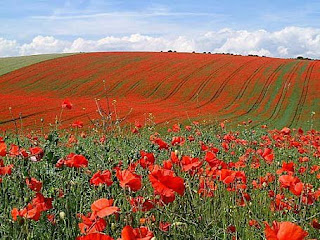100 Year Anniversary of the Armistice ending the
"War to End All Wars"
November 11, 1918 “on the eleventh hour of the eleventh day, of the eleventh month” marked the signing of the armistice ending the “Great War,” of 1914-18, “the war that no one wanted,” “the accidental war,” that started the 20th Century with the mechanized slaughter that resulted in 15 million deaths and 20 million wounded. Since the U.S. commemoration of “Armistice Day” was transformed by President Dwight D. Eisenhower after the second World War into a general commemoration of U.S. military veterans in any armed conflict, we Americans often forget the significance of this particular day.
Canadians and the British still preserve it as “Remembrance Day” with a heavy emphasis of the sacrifice and ideals of WWI, together with its futility. The wearing of red poppies is a major part of the commemoration, bringing to mind the poem by Canadian Lieutenant Colonel John McCrae beginning “In Flanders Fields, the poppies blow, between the crosses, row on row.”
Since Australians and New Zealanders lost most of their people in that conflict in the battle of Gallipoli (a failed effort to capture Constantinople from the Ottoman Turks), they commemorate the anniversary of the start of that battle, April 25, as Anzac Day (after the Australian and New Zealand Army Corps, which was decimated in the battle).
When I was a young man living in the North of France, I had the occasion to visit several of the sites of the trench warfare in the Flanders Fields during World War I, including Verdun and Vimy Ridge.
Verdun is where German and French soldiers faced off against each other in pitched trench warfare for most of the year 1916, firing about 40 million artillery shells at each other, killing 306,000 young men and maiming about a half million more. It was the longest and one of the most devastating battles in the history of warfare, which ended as a minor French tactical victory but overall was a costly strategic stalemate.
The site of the battle is to this day a tortured, scarred landscape with overlapping crater upon crater caused by the burst of artillery shells. Though now it is covered with green grass and is no longer the sea of mud and blood you see in the old photographs, you cannot go off of the marked roads and paths because the area still contains hundreds or thousands of mines and unexploded ordnance.
The battlefield cemetery there has a large memorial, the base of which is an ossuary—a mass grave for the bones of the dead, since thousands were recovered only in pieces.
The Canadian cemetery at nearby Vimy Ridge, with its preserved trenches, graves, and haunting memorial with tower-like pylons and the overwhelmingly sorrow-filled statue of Canada Bereft, of a mother mourning her dead sons, is, one of those few places on earth, like Auschwitz, the Road of No Return (for Slaves) in Benin, the Choeung Ek "Killing Fields" Memorial in Cambodia, or the Memorial to the Victims of the Rape of Nanjing in Nanjing China, that brings a traveler face to face with great historical horror, overpowering and dreadful.
The U.S. “Flanders Fields” Cemetery across the border in Belgium is less theatrical in its presentation, but every bit as moving.
In the U.S., Veterans’ Day has become part of the Civil Religion. I read a Facebook posting this morning: “On Thanksgiving Day we thank God for our blessings; on Veterans’ Day, we thank him for those who fought and died for our blessings.” In the degree that we thereby honor the dead, this is right and fitting. In the degree, however, that we thereby celebrate the system of power and policy that produces such things as the “Great War” (or, indeed, that calls any war “Great”), the day is diminished and cheapened.
Friends from New Zealand gave me the gift of sharing with me Church music coming from their homeland. One of my favorites is the following piece written for Anzac Day:
http://www.youtube.com/watch?v=B8EhR44SUp4A Hymn for Anzac Day
Honour the dead, our country’s fighting brave,
honour our children left in foreign grave,
where poppies blow and sorrow seeds her flowers,
honour the crosses marked forever ours.Weep for the places ravaged with our blood,
weep for the young bones buried in the mud,
weep for the powers of violence and greed,
weep for the deals done in the name of need.Honour the brave whose conscience was their call,
answered no bugle, went against the wall,
suffered in prisons of contempt and shame,
branded as cowards, in our country’s name.Weep for the waste of all that might have been,
weep for the cost that war has made obscene,
weep for the homes that ache with human pain,
weep that we ever sanction war again.Honour the dream for which our nation bled,
held now in trust to justify the dead,
honour their vision on this solemn day:
peace known in freedom, peace the only way.
Music: © Colin Gibson 2005 Words: © Shirley Erena Murray
Tune: ANZAC 2005
















No comments:
Post a Comment